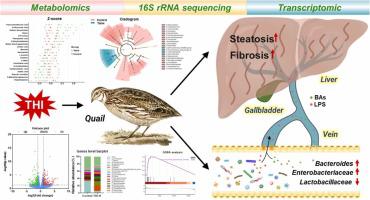Journal of Hazardous Materials ( IF 12.2 ) Pub Date : 2022-09-30 , DOI: 10.1016/j.jhazmat.2022.130082 Biqi Han 1 , Jiayi Li 1 , Siyu Li 1 , Yan Liu 2 , Zhigang Zhang 1

|
Neonicotinoid insecticides (NNIs) are the most widely used class of pesticides globally. However, NNIs may cause adverse health effects, including chronic liver disease, and perturbation of the gut microbiota. Thiacloprid (THI) is one of the NNIs widely used in agriculture. Therefore, it is essential to elucidate effects of THI on the microbiota–gut–liver axis to assess the risk of chronic liver disease following exposure to NNIs. This study aimed at investigating whether THI exposure promoted liver injury by altering the gut microbiota and related metabolites. In this study, healthy male quails were exposed to 2 or 4 mg/kg THI or 0.75 % (w/v) saline once daily for 6 weeks, respectively. Metabolomics, 16S rRNA sequencing, and transcriptomic methods were performed to analyze the toxic mechanisms of THI in Japanese quails. We found that THI evoked damage and disruption to intestinal barrier function, leading to increased harmful substances such as lipopolysaccharide (LPS) and phenylacetic acid entering the liver. Besides, our results showed significantly altered hepatic bile acid and cholesterol metabolism in THI-exposed quails, with abnormal liver lipid metabolism, showing severe liver injury, fibrosis, and steatosis compared with the control quails. In conclusion, THI exposure aggravates liver injury via microbiota–gut–liver axis.
中文翻译:

噻虫啉暴露对微生物-肠-肝轴的影响:日本鹌鹑的多组学机制分析
新烟碱类杀虫剂 (NNI) 是全球使用最广泛的一类杀虫剂。然而,NNIs 可能会对健康造成不利影响,包括慢性肝病和肠道微生物群的扰动。噻虫啉 (THI) 是广泛用于农业的 NNI 之一。因此,有必要阐明 THI 对微生物群-肠-肝轴的影响,以评估接触 NNI 后慢性肝病的风险。本研究旨在调查 THI 暴露是否通过改变肠道微生物群和相关代谢物来促进肝损伤。在这项研究中,健康的雄性鹌鹑分别每天一次暴露于 2 或 4 mg/kg THI 或 0.75 % (w/v) 盐水,持续 6 周。采用代谢组学、16S rRNA 测序和转录组学方法分析 THI 在日本鹌鹑中的毒性机制。我们发现 THI 会引起肠道屏障功能的损伤和破坏,导致脂多糖 (LPS) 和苯乙酸等有害物质进入肝脏。此外,我们的结果显示,与对照鹌鹑相比,THI 暴露鹌鹑的肝胆汁酸和胆固醇代谢显着改变,肝脏脂质代谢异常,表现出严重的肝损伤、纤维化和脂肪变性。总之,THI 暴露通过微生物-肠-肝轴加重肝损伤。与对照鹌鹑相比,显示出严重的肝损伤、纤维化和脂肪变性。总之,THI 暴露通过微生物-肠-肝轴加重肝损伤。与对照鹌鹑相比,显示出严重的肝损伤、纤维化和脂肪变性。总之,THI 暴露通过微生物-肠-肝轴加重肝损伤。











































 京公网安备 11010802027423号
京公网安备 11010802027423号